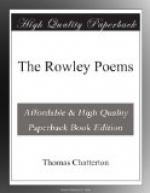Clevis or cleves is the plural number of Cleve, a cliff. It is so used by Chaucer. I cannot believe that it was ever used as a singular noun.
EYNE. E. II. 79. T. 169. See also AE 681.
In everich eyne aredynge nete of
wyere.
Wythe syke an eyne shee swotelie
hymm dydd view.
Eyne, a contraction of eyen, is the plural number of eye. It is not more probable that an ancient writer should have used the expressions here quoted, than that any one now should say—In every eyes;—With such an eyes.
HEIE. E. II. 15. T. 123. Le. 5. 9. Ent. 2. AE 355.
Heie, the old plural of He, was obsolete, I apprehend, in the time of the supposed Rowley. At least it is very improbable that the same writer, at any time, should use heie and theie indifferently, as in these poems.
THYSSEN. E. II. 87.
Lette thyssen menne, who haveth sprite of love.
I cannot believe that thyssen was ever in use as the plural number of this. The termination seems to have been added, for the sake of the metre, by one who knew that many words formerly ended in en, but was quite ignorant of what particular sorts they were. In the same manner coyen, AE. 125. and sothen, AE. 227. are put for coy and sothe, contrary to all usage or analogy.
And this leads me to the capital blunder, which runs through all these poems, and would alone be sufficient to destroy their credit; I mean, the termination of verbs in the singular number in n[3]. I will set down a number of instances, in which han is used for the present or past time singular of the v. Have; only premising, that han, being an abbreviation of haven, is never used by any ancient writer except in the present time plural and the infinitive mode.
P. 26. v. 9. The Brytish Merlyn oftenne
hanne
The
gyfte of inspyration.
Ba. 2. The featherd songster
chaunticleer
Han wounde hys bugle horne.
AE. 685. Echone wylle wyssen hee hanne seene the daie.
734. Bryghte sonne han ynne hys roddie robes byn dyghte.
650. Whanne Englonde han her foemenn.
1137. ——Mie stede han notte mie love.
1184. Hanne alle the
fuirie of mysfortunes wylle
Fallen onne mie benned headde I hanne
been AElla stylle.
G. 20. Hane Englonde thenne a tongue butte notte a stynge?
M. 61. A tye of love a dawter faire she hanne.
H. 1. 74. Ne doubting but
the bravest in the londe
Han by his foundynge arrowe-lede
bene sleyne.
182. Where he by chance han slayne a noble’s son.
184. And in the battel he much goode han done.




